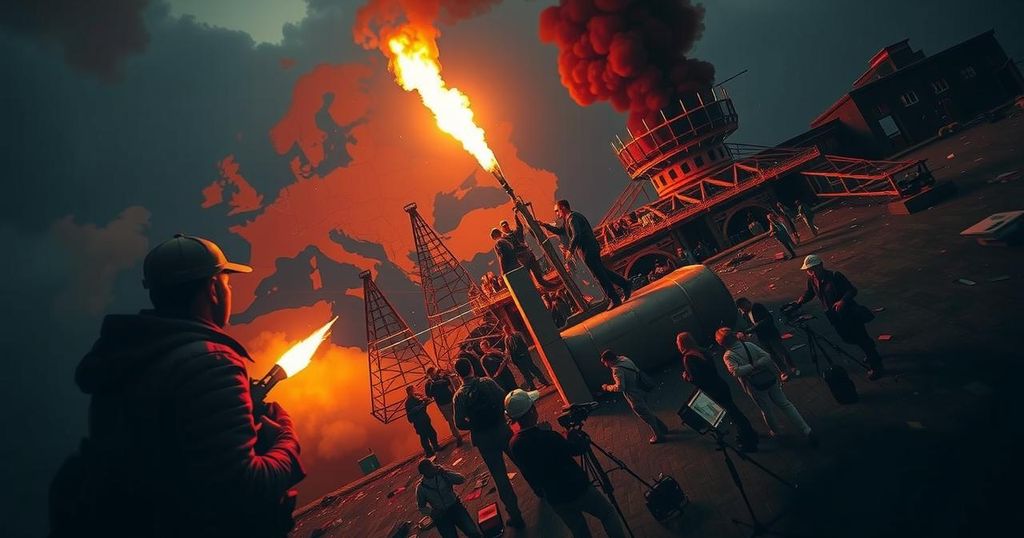Recent Israeli airstrikes in Khan Younis have reportedly killed at least 28 Palestinian civilians, alongside significant attacks on Jabalia, causing severe humanitarian repercussions. In Lebanon, an airstrike claimed the lives of several media workers, raising alarm over journalist safety in conflict regions. Meanwhile, US Secretary of State Antony Blinken is engaged in diplomatic efforts with key regional leaders to address the escalating crisis.
This report outlines the latest developments in the ongoing conflict in the Middle East, particularly focusing on the alarming escalation of violence in Gaza and its repercussions. On Friday morning, an Israeli airstrike in Khan Younis reportedly resulted in the deaths of at least 28 Palestinian civilians. The attack specifically targeted a residential area in the al-Manara neighborhood, creating numerous injuries and widespread devastation, exacerbating fears of a humanitarian crisis. Furthermore, the assault on Gaza included significant destruction in Jabalia, where residential buildings have been demolished, leading to what has been termed a ‘major massacre’ by local civil defense authorities. In a separate incident, an Israeli airstrike tragically killed several media personnel in southern Lebanon, including two staff members from Al-Mayadeen and one from Al-Manar. This action has raised critical concerns regarding the safety of journalists in conflict zones. Concurrently, US Secretary of State Antony Blinken is scheduled to meet with Lebanese Prime Minister Najib Mikati and foreign ministers from Jordan and the United Arab Emirates in an effort to stabilize the region post-conflict. Blinken emphasized that the actions against Israel by Iran could lead to a reckoning that would ultimately jeopardize Iranian interests. The Israeli government has also indicated its commitment to retaliate against hostile actions from Iran, particularly after a missile barrage on October 1. Amidst these tensions, new military strategies are reportedly being devised by Iran’s leadership in response to the escalating Israeli assaults on its allies in Gaza and Lebanon. There have also been direct strikes on Beirut’s southern suburbs, indicating a broadening of the conflict’s scope. As the humanitarian situation continues to deteriorate, with reports of hundreds of casualties among civilians and extensive destruction, calls for a ceasefire and peace negotiations have been intensified by international leaders, including President Emmanuel Macron of France, who voiced concern that violent retaliation serves to undermine civilization rather than protect it.
The current crisis in the Middle East, particularly involving Israel, Gaza, and Lebanon, has arisen from a series of violent confrontations that have resulted in significant civilian casualties. Israel’s ongoing military operations aim to combat threats posed by Hamas and other armed groups within Gaza, leading to a severe humanitarian crisis. Reports indicate thousands of deaths and injuries on both sides, reflecting the dire consequences of the conflict. Additionally, the involvement of regional players, including Iran, complicates the situation, as their military preparedness could potentially escalate hostilities further. Efforts for diplomatic resolutions are being sought, but have often floundered amid continued violence and retaliatory strikes.
In summary, the situation in the Middle East reflects an urgent humanitarian crisis exacerbated by escalating violence between Israel and Palestinian groups, the involvement of Hezbollah in Lebanon, and the emergence of international diplomatic discussions led by the United States. The tragic loss of life confirmed by recent airstrikes, particularly affecting civilians and media personnel, signals the need for immediate action towards a ceasefire and humanitarian assistance. The complexity of the conflict, compounded by regional dynamics and international interventions, necessitates careful navigation to prevent further escalation and promote conditions conducive to peace.
Original Source: www.theguardian.com






